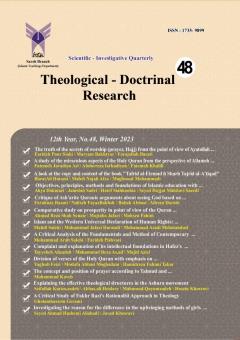A Critical Analysis of the Fundamentals and Method of Contemporary Separatists in the Interpretation of the Qur'an
Subject Areas : کلام اسلامی
Mohammad عربصالحی
1
*
,
Farideh Pishvaei
2
![]()
1 -
2 - A student of the fourth level of comparative interpretation; Professor and researcher of Islamic Studies Research Center of Al-Zahra Society.
Keywords:
Abstract :
The intellectual trend of "separatism" (Tafkik) which is chronologically divided into predecessor and successor periods, while negating the philosophical intellect in comprehending the Qur'an, acknowledges merely an interpretation based upon the correct tradition. The contemporaries of this trend take a more balanced approach compared to their predecessors, and with a specific definition of intellect, they assume functions for it in interpretation. The present article, using the documentary method for data collection and a critical approach, evaluates the fundamentals and interpretive method of separatism with a focus on instances of their work, and seeks to prove the hypothesis that despite such merits as special attention to the divine understanding of the Qur'an or the use of the analytical intellect, contemporary separatists’ foundation and interpretive method suffer from drawbacks and disadvantages. The most significant critiques are to diminish the deep Qur'anic teachings to comparative and apparent signification, to regard personal perceptions as proof, and to pose obstacles to the extension of knowledge by some verses. While this trend accuses its opponents of imposing human findings on the interpretation of the Qur'an, it considers its own understanding of the Qur'an, with its separative presuppositions in interpretive method and foundation, to be the very meaning perceived by the innate intellect, without presenting a precise system of the epistemological approach and the requirements of its system of thought. This reduces the scientific weight of this trend and puts it in a lower position than other interpretive approaches.
قرآن کریم
نهجالبلاغه
اشرفی،امیررضا،(1398).مبانی تفسیری علامه طباطبایی در المیزان، مبانی مرتبط با متن قرآن، قم،موسسه امام خمینی(ره).
بابایی،علی اکبر،(1392).مکاتب تفسیری، قم، پژوهشگاه حوزه و دانشگاه .
تهرانی، میرزاجواد،(بی-تا).تفسیر مصباح الهدی، تحقیق سیدمهدی حسینی مجاهد، قم،آفاق نور.
ارشادی نیا، محمدرضا(1386). از مدرسه معارف تا انجمن حجتیه و مکتب تفکیک، قم، بوستان کتاب.
____________،(1379).«مبانی فهم متون دینی از نگاه تفکیک»، پژوهش¬های قرآنی،ش21و22.
حسین¬زاده، محمد،(1390).نگاهی معرفت¬شناختی به وحی،الهام،تجربه دینی و عرفانی و فطرت، قم،موسسه امام خمینی(ره).
حکیمی، محمدرضا،(1387).«مبانی تفسیر در مکتب تفکیک»،آفاق نور،ش7.
___________،(1376).مکتب تفکیک، تهران، دفتر نشر فرهنگ اسلامی.
___________،(1378).اجتهاد و تقلید در فسلفه، تهران، دفتر نشر فرهنگ اسلامی.
سبحانی،جعفر،(1384).المناهج التفسیریه، قم،مؤسسه امام صادق(ع).
سروش،عبدالکریم،(1378).بسط تجربه نبوی،تهران، صراط.
سیدان، سیدجعفر،(1381).میزان شناخت،مشهد، طوس.
_________ ،(1391).آیات العقاید،مشهد،ولایت.
_________،(1388).تفسیر بخشی از سوره مبارکه فرقان،مشهد، پایگاه اطلاع رسانی آیت الله سیدان.
شبیری زنجانی،سیدمحمدجواد،(1376).«در حاشیة دو مقاله»،آینة پژوهش، ش48.
طباطبایی،محمدحسین،(1390).المیزان فی تفسیرالقرآن،بیروت،اعلمی.
________________،(1372).نهایه الحکمه، قم، نشر اسلامی.
طبرسی،فضل-بن حسن،(1372).مجمع البیان فی تفسیر القرآن،تهران، ناصرخسرو.
طوسی،حسن،(بی-تا).التبیان فی تفسیر القرآن،تصحیح احمد حبیب عاملی،بیروت،دار احیاءالتراث العربی.
عمید زنجانی،عباسعلي،(1373).مبانی و روش¬های تفسیر قرآن،تهران، وزارت فرهنگ و ارشاد اسلامی.
عبداللهیان،محمد،(1387)،روش تفسیری آیت¬الله میرزاجوادآقا تهرانی و ویژگی¬های تفسیر مصباح¬الهدی، آفاق نور،ش7.
قائمی¬نیا،علیرضا،(1389). بیولوژی نص،تهران، پژوهشگاه فرهنگ و اندیشه اسلامی.
كليني،محمد،(1407ق).الكافي، تهران، دارالكتب الاسلامي.
مجلسی،محمدباقر،(1403ق).بحارالانوار، بیروت، موسسه الوفاء.
معرفت،محمدهادی،(1423).شبهات و ردود حول القرآن الكريم، قم،التمهید.
ملکی-میانجی،محمدباقر،(1414ق).مناهج البیان فی تفسیر القرآن، تهران، وزرات فرهنگ و ارشاد اسلامی.
____________ ،(1435ق).توحیدالامامیه،تهران،وزارت فرهنگ و ارشاد اسلامی.
.نگاهی به مکتب تفکیک (مجموعه مقالات: محمدرضا حکیمی، عقل خودبنیاد دینی؛ سید حسن اسلامی، مکتب تفکیک در بوته نقد؛ صادق لاریجانی، بازخوانی مکتب تفکیک؛ مکتب تفکیک:استقلال وحیانی گفتگو با سیدجعفر سیدان؛ در نقد مکتب تفکیک، گفتگو با غلامحسین ابراهیمی دینانی)،(1384).به کوشش میرعبداللهی،سیدباقر،پورمحمدی، علی،تهران،همشهری.
نامور مطلق، بهمن،(1388).«از تحلیل بینامتنی تا بیناگفتمانی»،پژوهشنامه فرهنگستان هنر، ش12.
https://www.eshia.ir/Feqh/Archive/javadi/tafsir

